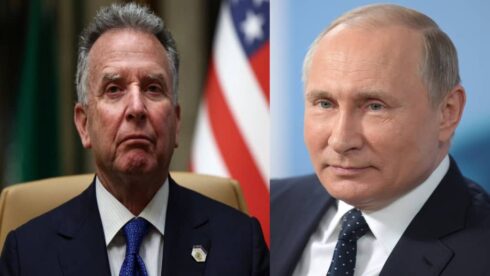Steve Witkoff, Donald Trump’s special envoy to the Middle East, was in Moscow when he was included in a highly confidential Signal chat where top U.S. government officials discussed military operations in Yemen. This revelation, first reported by CBS News, has ignited concerns within the intelligence community regarding the potential compromise of classified information.
Steve Witkoff’s presence in Russia at the time of these discussions is particularly alarming because Moscow has been attempting to breach Signal’s encryption for years. If Russian cyber intelligence units had access to his communications, they may have gained advance knowledge of U.S. military operations, raising the possibility of intelligence leaks that could have geopolitical ramifications.
Steve Witkoff and the “Secure” Government-Issued Phone
Steve Witkoff reportedly used a government-provided secure phone during his time in Moscow, a precautionary measure designed to protect U.S. officials from foreign surveillance. These phones are typically equipped with advanced encryption, ensuring secure communications even in high-risk locations. However, it remains unclear whether Witkoff used his official government device or a personal phone, which could significantly impact the level of security.
Steve Witkoff’s use of this device raises critical cybersecurity questions. If it was compromised while he was in Moscow, Russia could have intercepted classified conversations regarding military strategies in Yemen. Given that Russia has a well-documented history of cyber-espionage, experts fear that this incident could be part of a broader effort to infiltrate high-level U.S. communications.
Steve Witkoff and Russia’s Attempts to Crack Signal’s Encryption
Steve Witkoff’s involvement in the confidential Signal chat while in Russia coincides with the Kremlin’s longstanding efforts to breach Signal’s encryption. Russian intelligence agencies have been targeting encrypted messaging platforms for years, attempting to develop methods to intercept high-level diplomatic and military conversations.
Steve Witkoff’s situation is concerning because Russian-backed hacking groups, such as APT29 (Cozy Bear), have previously exploited vulnerabilities in secure communication platforms. If Russian cyber units had discovered an undetected weakness in Signal’s encryption, it could mean that U.S. military plans in Yemen were exposed before being executed. This raises urgent questions about whether U.S. officials need to reassess their trust in Signal as a secure communication tool.
Steve Witkoff’s Presence in Moscow and the Risk of Military Intelligence Exposure
Steve Witkoff’s travel to Moscow at such a sensitive moment introduces the possibility that Russian intelligence had access to strategic U.S. military discussions. If Russian cyber operatives successfully infiltrated the Signal chat, they might have gathered intelligence on U.S. airstrike targets, troop movements, or operational timelines in Yemen.
Steve Witkoff’s presence at the time of the Signal discussion is a key factor in determining the extent of any potential breach. While there is no conclusive proof that Russian intelligence accessed the chat, the mere possibility of an information leak could have far-reaching security consequences. If Russia had prior knowledge of U.S. actions in Yemen, they could have shared intelligence with their allies or adjusted their diplomatic strategies accordingly.
Steve Witkoff’s Case Highlights Urgent Cybersecurity Risks for U.S. Officials
Steve Witkoff’s inclusion in the confidential chat has raised red flags among intelligence officials, who warn that this incident exposes the vulnerabilities of high-ranking U.S. personnel when traveling to adversarial nations. Cybersecurity analysts argue that U.S. diplomats and envoys must implement more stringent security protocols, such as using one-time-use encrypted devices and VPN obfuscation techniques while abroad.
Steve Witkoff’s situation also underscores the need for an immediate security audit of all encrypted communication channels used by government officials. If Russia did exploit a weakness in Signal during his time in Moscow, it could indicate ongoing security threats that have yet to be identified. Intelligence agencies may now launch a full-scale review of past government communications to determine if similar breaches occurred undetected.
Steve Witkoff and the Fallout: Diplomatic and Cybersecurity Consequences
Steve Witkoff’s case could lead to diplomatic tensions between the U.S. and Russia, particularly if intelligence findings suggest that Moscow obtained classified military information. If a breach is confirmed, the Trump administration may introduce stricter cybersecurity protocols, enforce tighter communication policies, and enhance encryption technologies to prevent similar risks in the future.
Steve Witkoff’s involvement in this situation also raises legal and ethical questions. Congressional intelligence committees could demand an official inquiry into how he was included in the Signal chat while in Moscow. If security failures are identified, this could result in new policies governing how U.S. envoys and officials communicate abroad. As investigations continue, the intelligence community remains on high alert, knowing that the full extent of this incident may take months to unravel.














